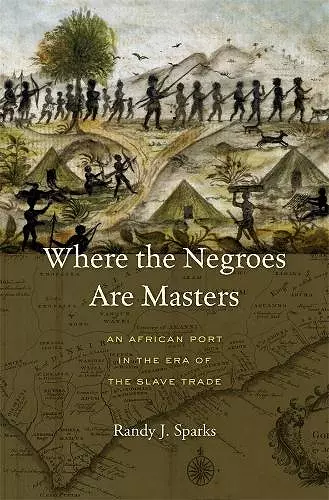Where the Negroes Are Masters
An African Port in the Era of the Slave Trade
Format:Hardback
Publisher:Harvard University Press
Published:6th Jan '14
Currently unavailable, and unfortunately no date known when it will be back

Annamaboe was the largest slave trading port on the eighteenth-century Gold Coast, and it was home to successful, wily African merchants whose unusual partnerships with their European counterparts made the town and its people an integral part of the Atlantic’s webs of exchange. Where the Negroes Are Masters brings to life the outpost’s feverish commercial bustle and continual brutality, recovering the experiences of the entrepreneurial black and white men who thrived on the lucrative traffic in human beings.
Located in present-day Ghana, the port of Annamaboe brought the town’s Fante merchants into daily contact with diverse peoples: Englishmen of the Royal African Company, Rhode Island Rum Men, European slave traders, and captured Africans from neighboring nations. Operating on their own turf, Annamaboe’s African leaders could bend negotiations with Europeans to their own advantage, as they funneled imported goods from across the Atlantic deep into the African interior and shipped vast cargoes of enslaved Africans to labor in the Americas.
Far from mere pawns in the hands of the colonial powers, African men and women were major players in the complex networks of the slave trade. Randy Sparks captures their collective experience in vivid detail, uncovering how the slave trade arose, how it functioned from day to day, and how it transformed life in Annamaboe and made the port itself a hub of Atlantic commerce. From the personal, commercial, and cultural encounters that unfolded along Annamaboe’s shore emerges a dynamic new vision of the early modern Atlantic world.
Where the Negroes Are Masters is a pathfinding work that surely will have great influence on our understanding of ‘the largest forced migration in history.’ Sparks is a diligent researcher who shows the many ways in which the Fante leadership entrenched its position in the trade… An interesting and important book. -- Jonathan Yardley * Washington Post *
Carefully researched, completely engaging… Sparks recounts a story that is so telling, and so profound in its implications, that it should be explored in every school in the land—and used as a touchstone for a new way of describing the birth of America. -- Marc Aronson * School Library Journal *
Africans entered the trans-Atlantic slave trade as more than cargo; many operated as wily merchants integral to the far-reaching Atlantic commerce that began with European contact and the search for gold in the 1430s and shifted to traffic in humans… Unveiling African merchant elites functioning as cultural brokers, literate in English and traveled in Europe and the Americas, and operating as major forces responding to 18th-century market opportunities, Sparks expands our understanding of the Atlantic connections of West Africa’s coastal trading communities. -- Thomas J. Davis * Library Journal (starred review) *
This persuasive, well-researched study of the 18th-century Atlantic slave trade takes the unique approach of examining ‘the African merchant elites who facilitated that trade,’ who, according to Tulane University history professor Sparks, ‘were as essential to the Atlantic economy as the merchants of Liverpool, Nantes, or Middleburg.’ That premise may be somewhat surprising, if not outright provocative, but he delivers proof. * Publishers Weekly *
If you want to know how the slave trade worked on Africa’s west coast, there is no better starting point than Randy Sparks’s brilliant urban biography of the Gold Coast port of Annamaboe. It elevates our understanding of the Atlantic in the age of the transatlantic slave trade to new heights. -- Ira Berlin, author of Many Thousands Gone: The First Two Centuries of Slavery in North America
Randy Sparks takes what might appear to be a minor port on the Gold Coast and gives us a history of the whole Atlantic Basin, through the history of one carefully defined branch of the slave trade. He shows us how multiple actors from different cultures speaking a number of different languages managed to cooperate, argue, compete, and finally succeed in knitting a transatlantic community together. This is a masterpiece of turning micro-history, with its fine detail, into mega-history of the first magnitude. -- John Thornton, author of A Cultural History of the Atlantic World, 1250–1820
This well-written and altogether gripping story is Atlantic history at its best. Randy Sparks demonstrates the complexity of enslavement itself, examining the multiple processes by which persons came to be construed as property, both on the coast of Africa and in the Atlantic trade. -- Rebecca J. Scott, coauthor of Freedom Papers: An Atlantic Odyssey in the Age of Emancipation
Randy Sparks’s well-illustrated study of this Gold Coast port expands and deepens our understanding of African middlemen’s importance in the Atlantic economy before 1800 and of the operations of the transatlantic slave trade. -- David Northrup, author of Africa’s Discovery of Europe, 1450–1850
- Nominated for African Studies Association (ASA) Best Book Prize (formerly known as the Melville J. Herskovits Prize) 2015
- Nominated for Frederick Douglass Book Prize 2015
- Nominated for Martin A. Klein Prize in African History 2015
- Nominated for James A. Rawley Prize in Atlantic History 2015
ISBN: 9780674724877
Dimensions: unknown
Weight: unknown
328 pages